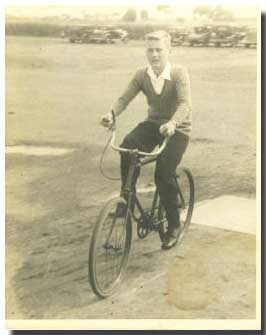That's Language
by Murray Waldren
C
opyright, The Australian, October 4, 2003
Being a child of the Depression,
Mackenzie Gregory remembers fellow
Melburnians giving their pals a dink if
they were lucky enough to own a bike. This
idiom for takin someone for a ride on the
crossbar has intrigued him for 70 years and
he wants answers as to where it came from, now.
Gregory could also have dinked
someone on horse or motorbike, and if he
had moved regions might then have double
dinked (or doubled or double banked).
This share-the-transport sense of dink
appears an Australian coinage but
compelling reasons as to why are difficult to
trace. The word sounds like someone
clicking a wine glass, and has crossed
cultures and generations. In the late 19th
century, dink has the adjectival sense of
neat or trim, being press-ganged into wider
usage from the Scots. It soon mutated into
dinky, pretty and/or chintzy, and also came
to mean insignificant, probably from an
early 20th-centry jazz lingo association
with rinky-dink, meaining outmoded or
broken down.
In Australia, though, we fell fair dinkum
in live with the term fair dinkum. Dinkum
has 19th-century British dialect for work of
the hard yakka variety (and if you've ever
dinked someone uphill, you'll appreciate
how apt that is). In north Lincolnshire,
though, fair dinkum meant fair dealing,
which was transformed in Australia into
meaning genuine and later spawned fair
dinks and dinky-di.
In the US, by contrast, to kink around it to
addle about, and you can dink things out by
adding bunting. but if you use dink as a
noun, context if everything: on the means
streets, a dink is a rival ganager member, which
can be fatal if applied to you. To sailors, a
dink is a dinghy (of 19th-centry origin), and
in hush-ma-mouth society it's a cutesy
colloqualism for the male appendage
In the 1940s, dink became a term for that
soft return (often off the wood) where the
tennis ball drops over the net, and in the
Vietnam War US soldiers gave it a racist
edge (if Apocalypse Now and Platoon are
credible) as a pejorative term for the
Vietcong, In the '90s, dink was made over as
a post-SNAG-ish acronym for
unencumbered, upwardly mobile couples
(dual income no kids), and in IT circles
today it signifies experts of the nit-picking
kink, data-dinks.
None of which helps Gregory, who until
the reader cavalry arrives must remain
philosophical: I dink, therefore I am.
waldrenm@theaustralian.co.au
As Murray has possibly found out it was far more enjoyable to have your protective arm around a girl on the bike than your mate..(or some of my mates anyway).......................

